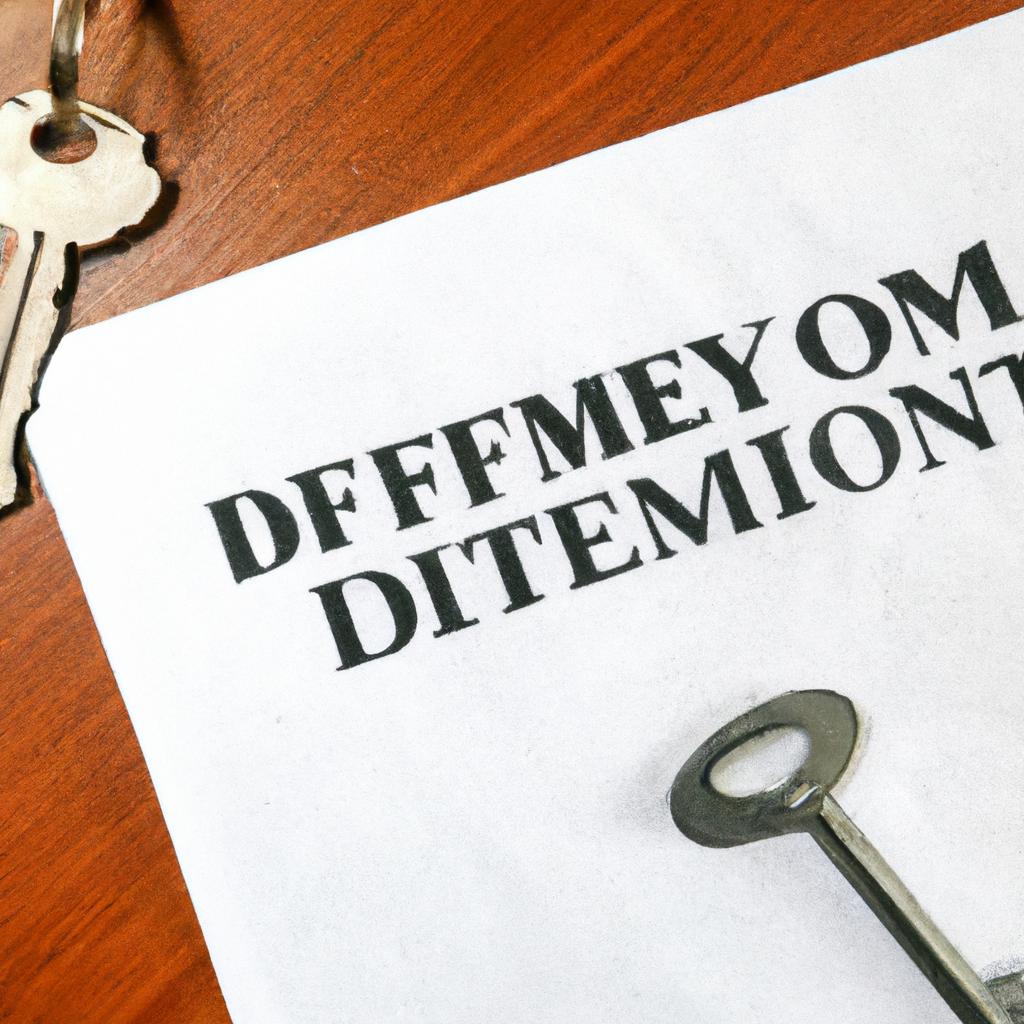Welcome to Morgan Legal Group, where we specialize in all aspects of estate planning and property law. Today, we delve into the often-overlooked but crucial document that serves as the foundation of homeownership – the deed to your house. As experienced lawyers in New York City, we understand the importance of ensuring that your property rights are protected and secured. Join us as we explore the complexities of this essential legal document and delve into the implications of holding the deed to your most valuable asset.
Understanding the Importance of the Deed to Your House
When it comes to owning a house, the importance of the deed cannot be overstated. The deed is a legal document that proves ownership of a property and provides important information about the property’s history. is crucial for protecting your investment and ensuring that your property rights are secure.
Here are some key reasons why the deed to your house is so important:
- Proof of Ownership: The deed is the official document that shows you are the rightful owner of the property.
- Property Description: The deed contains detailed information about the property, including its legal description, boundaries, and location.
- Transfer of Ownership: The deed is used to transfer ownership of the property from one party to another, such as in a sale or inheritance.
- Legal Rights: The deed outlines your legal rights to the property, including the right to use, sell, or transfer it.
- Title Insurance: Lenders often require title insurance to protect against any claims or disputes regarding the property’s ownership, which is based on the information contained in the deed.

Key Information Found in Your House Deed
When reviewing the deed to your house, it is crucial to pay attention to key information that can impact your property ownership. Understanding the contents of your house deed is essential for homeowners to protect their interests and rights. Below are some important details to look for in your house deed:
- Property Description: The deed should provide a detailed description of the property, including the address, lot number, and boundaries.
- Owner Information: The deed should list the current owner of the property, as well as any previous owners.
- Legal Description: This section includes the legal description of the property, which is used for legal purposes in identifying the property.
| Section | Details |
|---|---|
| Property Description | 123 Main Street |
| Owner Information | John Smith |
Overall, the deed to your house is a crucial legal document that outlines important information regarding your property ownership. It is recommended to review the deed carefully and seek professional advice if you have any questions or concerns about its contents. At Morgan Legal Group, our team of experienced lawyers can assist you with any estate planning, probate, elder law, Wills, and trust matters related to your property deed.

Ensuring Your House Deed is Properly Transferred
When it comes to ensuring the proper transfer of the deed to your house, there are several important steps that must be followed to protect your property rights. It is crucial to have a thorough understanding of the process and ensure that all necessary legal requirements are met. Here are some key considerations to keep in mind:
- Verify the current ownership: Before transferring the deed to your house, it is essential to verify that you are the rightful owner of the property. This can be done by reviewing the title documents and conducting a title search to confirm legal ownership.
- Prepare the necessary paperwork: To transfer the deed to your house, you will need to prepare the appropriate legal documents, such as a deed of conveyance or a quitclaim deed. These documents must be properly executed and recorded with the county clerk’s office to ensure the transfer is legally valid.

Legal Implications of Errors in House Deed Transfers
When it comes to house deed transfers, errors can have significant legal implications that must be addressed promptly. A simple mistake in the transfer process can lead to complications and disputes down the line. It is crucial to ensure that the deed to your house is accurately and legally transferred to avoid any potential issues.
Some common include:
- Clouded Title: Errors in the deed transfer process can result in a clouded title, which can make it difficult to sell the property in the future.
- Ownership Disputes: Incorrectly transferring the deed can lead to ownership disputes with other parties who may claim rights to the property.
- Liability Concerns: Errors in the deed transfer can also impact liability issues, such as property taxes and insurance coverage.
Q&A
Q: What is a deed to your house?
A: A deed to your house is a legal document that proves ownership of the property.
Q: Why is it important to have a deed to your house?
A: Having a deed to your house is important because it provides evidence of ownership and protects your rights to the property.
Q: How do you obtain a deed to your house?
A: A deed to your house is typically provided by the seller at the time of purchase. It is then recorded with the local government to officially transfer ownership.
Q: What information is included in a deed to your house?
A: A deed to your house includes the names of the buyers and sellers, a legal description of the property, and the purchase price.
Q: Can a deed to your house be transferred to someone else?
A: Yes, a deed to your house can be transferred to someone else through a process known as a property transfer or deed transfer.
Q: What happens if you lose the deed to your house?
A: If you lose the deed to your house, you can usually obtain a copy from the local government office where it was originally recorded. It is always recommended to keep a copy in a safe place.
The Way Forward
In conclusion, having the deed to your house is not just a piece of paper, but a symbol of ownership, security, and the place you call home. It is a powerful legal document that confirms your rights and responsibilities as a homeowner. So, make sure to keep it safe and secure, and always know its significance in protecting your investment. Whether you are a first-time buyer or a seasoned homeowner, the deed to your house is a valuable asset that should not be taken lightly. By understanding its importance and taking the necessary steps to safeguard it, you can ensure peace of mind and stability for years to come.
 Deed to Your House: What You Need to Know
Deed to Your House: What You Need to Know
When it comes to buying a house, most people focus on the process of finding the perfect home, getting a mortgage, and closing the deal. However, what often gets overlooked is the importance of the deed to your new property. A deed is a legal document that provides proof of ownership and establishes the rights and boundaries of the property. In simple terms, it is the document that transfers the title of the home from the seller to the buyer.
In this comprehensive article, we will delve into the world of deeds and the crucial role they play in the home buying process. From understanding what a deed is to the different types of deeds, we will cover it all. So, whether you are a first-time homebuyer or a seasoned homeowner, read on to equip yourself with the knowledge of the deed to your house.
Understanding a Deed
A deed is a legal document that confirms the transfer of property ownership from one party to another. It includes the names of the buyer and seller, the legal description of the property, and the notarized signatures of both parties. Once it is signed, it becomes a legally binding document.
Types of Deeds
1. General Warranty Deed
A general warranty deed offers the most protection to the buyer. It guarantees that the seller has the legal right to transfer the property and that there are no hidden issues or encumbrances on the property. In case any such problem arises in the future, the seller is liable to compensate the buyer.
2. Special Warranty Deed
A special warranty deed is similar to a general warranty deed, but with fewer protections for the buyer. It only guarantees that the seller has not caused any issues during their ownership and does not guarantee against any problems that may have occurred before their ownership.
3. Quitclaim Deed
A quitclaim deed is the least expensive and least secure type of deed. It only transfers the seller’s interest in the property, if any, to the buyer. It does not offer any guarantees or protections, and the seller holds no responsibility for any issues that may arise with the property.
4. Grant Deed
Similar to a general warranty deed, a grant deed also offers protections to the buyer by guaranteeing that the seller has not conveyed the property to anyone else and that there are no liens or encumbrances on the property.
5. Trustee’s Deed
This type of deed is used when a property is being transferred from a trust. It guarantees that the trustee is authorized to sell the property on behalf of the trust and that the trust holds the legal title to the property.
Why is a Deed Important?
A deed is an essential document for both the buyer and the seller. It serves as proof of ownership, protects the buyer’s investment, and ensures a smooth transfer of property. Some other reasons why a deed is important are:
– It establishes the boundaries of the property, ensuring that the buyer knows exactly what they are purchasing.
– It provides legal protection to both parties in case of any discrepancies or disputes.
– It allows the buyer to secure a mortgage or take out any other loans against the property, using it as collateral.
– It is necessary for any future sale or transfer of the property.
How to Get a Deed?
The seller is responsible for providing a deed to the buyer at the closing of the sale. The deed is recorded at the county recorder’s office, making it an official document. The buyer should receive a copy of the recorded deed for their records.
Tips for Deed-Related Transactions
1. Hire a Real Estate Attorney
Buying or selling a home is a significant transaction, and it is always advisable to have a professional real estate attorney guide you through the process. They can review the deed and ensure that all necessary information is included.
2. Conduct a Title Search
Before buying a property, it is crucial to conduct a title search to ensure that the seller has a legal right to sell the property. This will also reveal any potential issues that may affect the property’s ownership.
3. Get Title Insurance
Title insurance provides protection for both the buyer and the lender in case of any unforeseen issues or claims on the property. It may seem like an unnecessary expense, but it can save you thousands of dollars in the long run.
4. Read and Understand the Deed
Make sure to read and understand the deed before signing it. If there are any mistakes or discrepancies, address them immediately to avoid any legal issues in the future.
Firsthand Experience: The Importance of a Deed
“I recently purchased my first home, and like most buyers, I was overwhelmed with the amount of paperwork involved. However, one document that stood out to me was the deed. My real estate agent explained to me the significance of the deed and advised me to have a real estate attorney review it before signing. I took their advice, and it was reassuring to know that my investment was protected. The whole process went smoothly, and I now have the peace of mind of knowing that I own my home legally.”
Benefits of Understanding Deeds
– Knowing the type of deed used can help you understand your rights and protections as a homeowner.
– Familiarity with the deed can make the process of buying a home more manageable and less stressful.
– Understanding the deed can help you make better decisions when it comes to buying or selling a property.
– It can save you from potential legal issues and disputes in the future.
Final Thoughts
In conclusion, the deed to your house is a vital document that confirms your ownership and protects your investment. It is important to understand the different types of deeds and seek professional help if needed. Remember to read and review the deed carefully before signing to avoid any potential issues. We hope this article has provided valuable information and insights into the world of deeds. Happy home buying!

